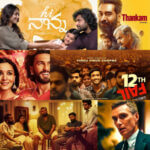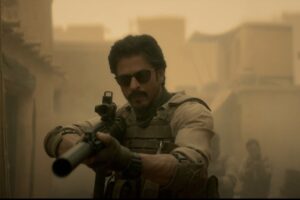
Vidya Balan needs the foremost attention here for the inimitable performance she put forward as Shakuntala Devi in the latest Anu Menon film. It’s not a biopic, but a biographical account on the life of the titular character from her daughter’s point of view. Vidya Balan portrays four different ages of the character, and her performance is so subtly genuine that you’ll understand each tiniest change that the character underwent in the respective stages of life. The way she laughs, walks, turns, smiles, shows her rejoice, everything has been picked up and delivered with utmost finesse. The sequence where she goes into a disagreement with her husband over her child’s future is performed with utmost clarity.
This brings me to the performance of Jishhu U. Sengupta. He is equally good as the calm, understanding and supportive Paritosh Banerjee, the husband whose love for Shakuntala Devi knew no bounds. Sengupta is getting his grounds in Bollywood, and that is something of a delight. He is a sensible actor, and the more he performs the more he’ll polish his acting intuitions. Sanya Malhotra adds to the splendour of performances in this film, and her portrayal of the disturbed daughter reflects impeccable conviction. Amit Sadh is living by the hour. The recent Breathe: Into the Shadows made him the focal point of discussions. This week, he has three releases. This film is accompanied with Tigmanshu Dhulia’s Yaara and Avrodh, a web series on Sony LIV. His portrayal of Ajay is bang on. Though he has a less screen space, he gives more than his fullest in them. We have a blink-and-you-miss appearance of Sheeba Chaddha, but she is brilliant.
Coming to the overall presentation, I am disappointed. The production design could have been more grounded. It does not have the heart, as far as my observation is concerned. The color scheme is too loud at times, giving the film an over the top polish. The background score is disturbing at times, being too loud or repetitive. Yes, the edit structure is good, jumping times and narrative instances. But, that is overshadowed by the aforementioned aspects. The dialogues are a bit dramatic, but I would not take that as a limitation as Shakuntala Devi claimed to be a person who was dramatic and loud at times. It was a justified way to portray her character. The other characters do not have such dramatism per se, and there lies the care of the writer.

The first thirty minutes or so of the film seemed way over the top, with lengthy dialogues preaching the emancipation of women, albeit in a very light-hearted manner. It got it’s due grip from the point where Shakuntala Devi reaches London in her youth. The screenplay has its flow from there, but I already mentioned the lackluster technicalities. The songs are a breath of fresh air though.
The film did not talk much about the activism of the titular character, but there’s a sequence where she justifies her interest for homosexuality to the fact that her then divorced husband was homosexual. Now, it’s true as per some interviews of the legendary figure, but the film shows that it was a lie that the author used to make her readers aware, as personal crises attract more attention. I am still searching for the answers here. What was the actual truth then?
I had a lot of expectation from the person who presented us with the fantastic Waiting, a few years ago. But, this turned out to be a tad bit disappointing. But, nonetheless it deserves a watch for the fantastic performances of all the actors involved.
















Add Comment